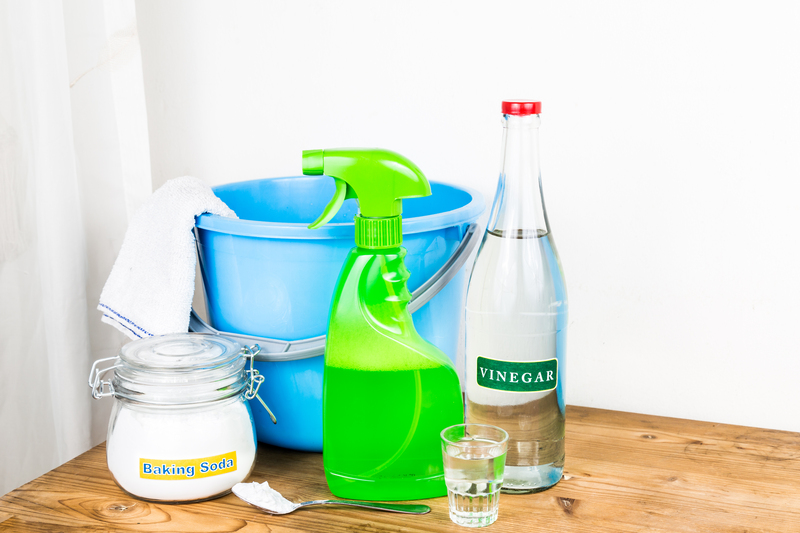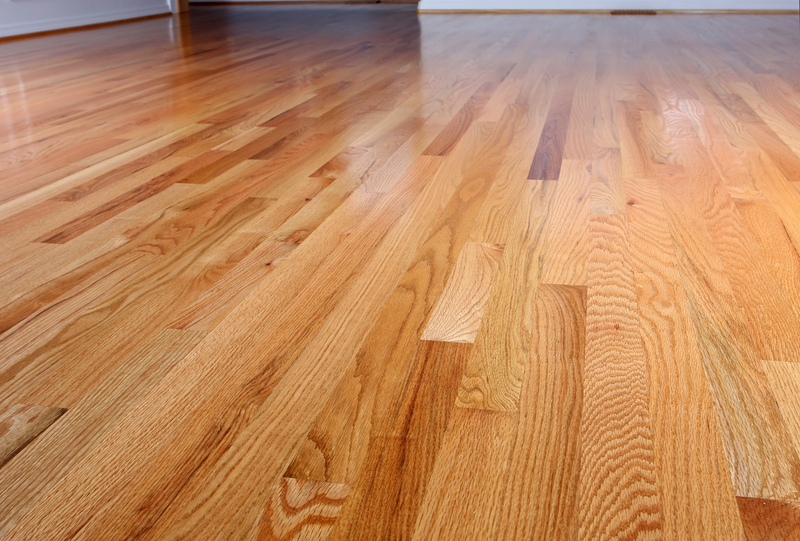The Ultimate Guide to Efficient Jewellery Cleaning
Posted on 06/09/2025
The Ultimate Guide to Efficient Jewellery Cleaning
Jewellery holds a special place in our lives, whether it's a treasured family heirloom, a romantic gift, or a fashionable piece that completes your look. However, over time, even the most radiant pieces can lose their luster due to dirt, grime, and everyday exposure. Efficient jewellery cleaning ensures your precious items stay beautiful, sparkling, and well-maintained for years.
In this comprehensive guide, we'll reveal expert tips, techniques, and best practices for cleaning every type of jewellery--from gold and silver to diamonds and gemstones. Read on to discover how to keep your collection shining, all with everyday materials and smart cleaning methods.
Why Is Regular Jewellery Cleaning Important?
The importance of routine jewellery cleaning cannot be overstated. Here are some key reasons why you should care for your treasures:
- Prevents Build-Up: Oils, lotions, perfumes, and dirt can accumulate and dull the gem's sparkle.
- Protects Settings: Debris may dislodge stones or damage prongs.
- Enhances Appearance: Clean pieces look more brilliant and enhance your overall look.
- Increases Longevity: Proper care prolongs the life of your jewellery.
- Supports Hygiene: Regular cleaning eliminates bacteria build-up.

Understanding Jewellery Materials and Their Cleaning Needs
Different materials require specific cleaning methods. Knowing what your jewellery is made from is crucial for efficient cleaning.
Common Jewellery Materials:
- Gold (yellow, white, rose)
- Silver
- Platinum
- Diamonds
- Gemstones (emerald, sapphire, ruby, opal, etc.)
- Pearls
- Costume Jewellery
Let's break down how to care for each.
Efficient Jewellery Cleaning: Step-By-Step
1. Pre-Cleaning Checks
- Inspect your items: Look for loose stones, worn prongs, or any visible damage. Cleaning a damaged piece can make problems worse.
- Avoid harsh chemicals: Many popular cleaners can harm delicate materials or finishes.
- Check if the jewellery is safe for water: Some fabric-backed, antique, or glued pieces may not be water-resistant.
2. Basic Efficient Jewellery Cleaning at Home
The following methods work well for most jewellery:
-
Warm Soapy Water Solution
- Mix: Use mild dish soap with lukewarm water.
- Soak: Place jewellery in the solution for 10-20 minutes.
- Brush: Use a soft toothbrush to gently remove dirt, especially in crevices.
- Rinse and Dry: Rinse with clean water and dry with a lint-free cloth.
-
Baking Soda Paste (For Silver)
- Mix: Combine three parts baking soda with one part water to make a paste.
- Rub: Use a damp cloth or your fingers to apply it gently.
- Rinse and Buff: Rinse well and polish dry.
Pro Tip: Always use lukewarm or room temperature water; extremes can cause stones to crack.
3. Specialised Cleaning for Precious Metals and Stones
- Gold: Withstands gentle soap and water; avoid abrasive materials. If needed, an ammonia solution (1 part ammonia to 6 parts water) can work, but use sparingly!
- Silver: Silver tarnishes easily. Use a commercial silver polish or a homemade paste of baking soda and water. Avoid silver dips for jewellery with stones.
- Diamonds: Soak in a mild detergent and use a soft toothbrush. Avoid bleach and household cleaners.
- Gemstones: Softer stones like opals and turquoise are porous--stick to water and mild soap and never soak them.
- Pearls: Wipe with a damp, soft cloth. Never immerse pearls in water or use soap--water can damage their natural luster and weaken the silk thread.
- Platinum: Use the warm soapy water method. Platinum is durable, but gentle cleaning is still best.
Tools & Products for Effective Jewellery Cleaning
Must-Have Tools:
- Soft toothbrush: Essential for precision cleaning.
- Lint-free or microfiber cloth: For drying and buffing a shine.
- Bowl of lukewarm water: Never clean over an open sink drain!
- Mild dish soap: Safe for most jewellery types.
- Baking soda: Great for silver and as a mild abrasive.
- Cotton swabs: Reach tight spots with care.
- Jewellery polishing cloth: Specially formulated to restore shine to most metals.
Recommended Commercial Products
- Jewellery-specific cleaning solutions: Designed to be gentle and effective.
- Ultrasonic Cleaners: These use high-frequency sound waves to dislodge dirt. Only use if safe for your jewellery--do not use with opals, pearls, or antique/soft-stone pieces!
- Silver dips and foams: Effective for tarnish but may not be suitable for all-piece types.
Always follow manufacturer's directions and, when in doubt, ask your jeweller.
Efficient Jewellery Cleaning Routines: Best Practices
How Often Should You Clean Your Jewellery?
- Everyday pieces (rings, necklaces): Once a week to remove oils and grime.
- Occasional wear items: Clean after use, especially if exposed to sweat or makeup.
- Stored jewellery: Clean before storing for long periods.
Storage Tips for Lasting Shine
- Store separately: Prevent scratches by using individual pouches or soft-lined boxes.
- Avoid air exposure: For silver, use anti-tarnish strips in airtight containers.
- Don't overcrowd: Give pieces enough space to avoid tangling or abrasion.
Common Mistakes in Jewellery Cleaning (and How to Avoid Them)
- Using toothpaste: It's abrasive and may scratch metals or stones!
- Harsh chemicals: Bleach, chlorine, and acetone can dissolve or discolor jewellery.
- Boiling water: Sudden temperature changes may fracture gemstones.
- Scrubbing with stiff brushes: Only use soft brushes; hard bristles can loosen stones.
- Neglecting hidden dirt: Gently clean behind stones and in settings for full sparkle.
Signs Your Jewellery Needs Professional Cleaning
- Persistent dullness despite cleaning
- Loosened stones or broken prongs
- Antique pieces or unknown materials
- Heavily tarnished silver or gold
If you experience these issues, it's time for professional jewellery cleaning and inspection.
Eco-Friendly and DIY Jewellery Cleaning Tips
Looking for sustainable jewellery cleaning options? Try these simple and effective recipes:
- Vinegar and Baking Soda (for Silver): Soak tarnished silver in 1/2 cup white vinegar and 2 tablespoons baking soda for two to three hours. Rinse and dry for an amazing shine!
- Aluminum Foil and Baking Soda: For deep silver tarnish, line a bowl with foil, add boiling water and a tablespoon of baking soda. Place silver items in contact with the foil--tarnish transfers off the silver onto the foil. Rinse and buff.
- Lemon Juice Solution (for brass): Combine lemon juice and water in equal parts, soak briefly, then rinse and dry thoroughly.
These natural jewellery cleaning methods are gentle, cost-effective, and environmentally friendly.
Jewellery Cleaning FAQ
Can I use dish soap to clean my gold ring?
Yes! Mild dish soap and lukewarm water is one of the best solutions for cleaning gold jewellery. Remember to rinse thoroughly and dry with a soft cloth.
What is the best way to clean diamond earrings?
Soak them in a solution of warm water and a few drops of gentle dish soap. Use a soft toothbrush to dislodge debris. Rinse and dry for a brilliant finish.
Is ultrasonic cleaning safe for all jewellery?
Not all jewellery! Avoid ultrasonics with porous stones (opals, pearls, turquoise), antique pieces, or glued components. When in doubt, check with a jeweller before using an ultrasonic cleaner.
How can I prevent my silver jewellery from tarnishing?
- Store in airtight bags.
- Use anti-tarnish strips.
- Avoid exposure to chemicals and water.
- Polish regularly with a silver cloth.
When to Seek Professional Jewellery Cleaning Services
Even with the best home care, some jewellery needs expert attention. Seek professional jewellery cleaning when:
- Cleaning fails to restore the desired shine.
- You notice damage or loose stones.
- Your items are antique, fragile, or high-value.
- Rhodium-plated (white gold) jewellery is showing yellow.
- It's been over a year since your last professional cleaning.
Professional services often include ultrasonic baths, steam cleaning, polishing, and a full inspection to ensure your precious pieces are in top condition.

Efficient Jewellery Cleaning: A Beautiful Habit
The habit of regular and efficient jewellery cleaning will preserve the original beauty, value, and sentiment of your cherished items. With the right tools, a little know-how, and consistency, anyone can ensure their jewellery stays sparkling for generations.
Ready for stunning shine? Make efficient jewellery cleaning part of your self-care routine!
Key Takeaways: The Ultimate Guide to Efficient Jewellery Cleaning
- Identify materials before cleaning your jewellery.
- Use mild, non-abrasive methods suitable for each type of jewellery.
- Establish a regular cleaning routine for best results.
- Store jewellery properly to prevent tarnishing and scratches.
- Seek professional care for complex, antique, or heavily soiled items.
- Remember: The safest approach is always the gentlest.
By following the practices shared in this guide, your jewellery will gleam with a brilliance that turns heads--and stands the test of time!




